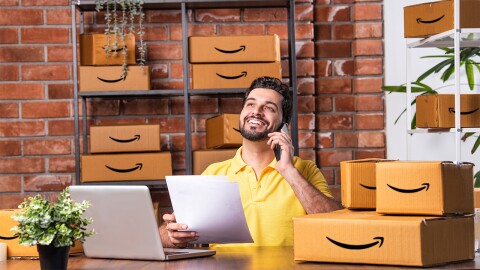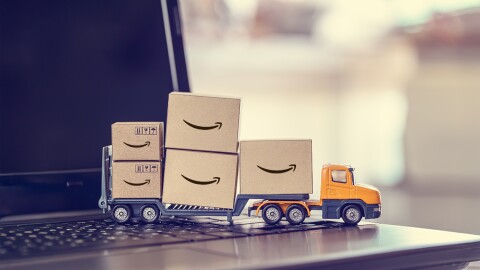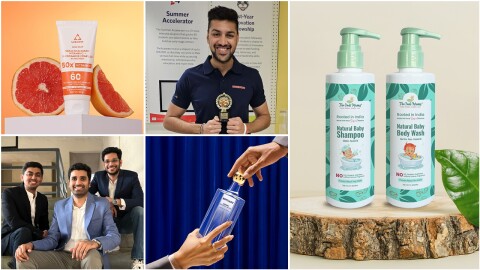At the fireside chat at Smbhav 2022, Dave Clark, CEO Worldwide Consumer, and Amit Agarwal, SVP India & Emerging Markets at Amazon discuss Dave’s personal journey, Amazon’s efforts to support customers, sellers, employees and communities during the pandemic, the launch of Smart Commerce in India and factors that will enable the 21st century to be India’s century.
Amit Agarwal:
Thank you for joining us today for the third edition of Amazon Smbhav. Dave, it’s been nearly 23 years for you at Amazon. We would love to know more about your incredible journey and your experiences prior to Amazon that have shaped you as a leader.
Dave Clark: Thank you, Amit, for having me. It's great to be here albeit virtually. To be honest, it doesn't feel like two decades with Amazon. It's been such an exciting journey. And I can't imagine having spent the last 23 years anywhere else. I graduated from graduate school on a Friday and started working at Amazon the following Monday. I've had the great fortune of working with incredible teams of people every day since.
I've done a variety of roles in our ops. teams, including leading a Fulfilment Centre and then later moving to Seattle to take on broader roles- including leading the acquisition of Kiva Systems, the robotics company that now powers many of our fulfilment centres around the world. Eventually, I led our global operations teams and today I get to oversee our worldwide consumer team. In this new role, I am perhaps most excited about getting the opportunity to work closely, supporting the sellers who choose to operate their businesses in our store. I'm incredibly proud of how the teams particularly in India, have invented on behalf of sellers and how many sellers trust Amazon.
I grew up in a small business family. We were from a small US town that was the carpet capital of the world. So we loaded up a truck of carpets and set up shop in another state- selling carpets and rugs to people. We would go sit on the weekends at flea markets, which are just basically big outdoor bazaars of small businesses trying to make deals with customers. I really wish we had an Amazon back then. But I learned a lot about how much time, energy and sacrifice are really required to run and grow a business. So, sellers are near and dear to my heart.
Amit Agarwal:
Dave, not many people here would know that you have also taught Music to school kids. It is so interesting; can you tell us more?
Dave Clark: Yes, so I studied music education when I was in undergraduate school at Auburn, where I used to play saxophone and tuba. And after graduating, I spent a year teaching junior high school students music before I headed off to business school. I found over the years that so many analytical people I know, and the best problem solvers are musicians of some sort. I really come to believe that music and math are very interconnected. I'd also say that once you've taught 250 13-year-olds how to play instruments, a lot of other leadership challenges really seem less challenging.
Amit Agarwal:
Just shifting topics, the last couple of years have been extremely challenging for everyone. Now, I've really found it humbling that hundreds of millions of customers globally have relied on Amazon to get what they need from the safety of their homes. How difficult was it to deliver on this responsibility in the middle of probably the biggest disruption in our living memory?
Dave Clark: You're so right, Amit. It was a challenge like no one's seen before. And not just the customers, but also sellers needed a way to get their goods to customers when their stores were closed. There wasn't a playbook to go by for how to do this. When the pandemic started in early 2020, really few people thought we'd be having as expansive and long running an event as we've had.
As the world shut down. I think Amazonians and sellers around the world recognised a sense of responsibility to support our communities in this challenging time. The health and safety of our employees have been our top priority, and we work to ensure smooth transitions into our new ways of working.
In fact, the second COVID wave in India was quite severe and it was inspiring to see how Amazonians in India and across the world rally together and leverage our global logistics infrastructure to bring critical medical supplies to people who needed them most. We'd spent Amazon's first 25 years building a very large fulfilment network and then had to double it, just in the last 24 months to meet customer demand. That was no small task for teams around the world. And I'm incredibly proud of the work they've done. I know there were some bumpy moments along the way for some sellers. And I'm deeply appreciative of their feedback and patience throughout the process- as we worked to ramp up to meet customer's needs and seller needs, during this time.
Amit Agarwal:
Indeed, it was very inspiring to see Amazonians across the world come together and go beyond their normal job to help each other as well as our customers and selling partners in our communities. Dave, on a different topic, you've been in your new role for about a year and a half. Can you share some of your top priorities as the CEO of Amazon's Worldwide Consumer Business?
Dave Clark: Yeah, it's been a fun year and a half, and my focus is always on our customers. But our definition of who is a customer is broad and all-encompassing. It includes different types of consumers as well as sellers around the world. To me, sellers are one of my customers. And as I mentioned earlier, given my history growing up in a small business, a big priority for me has been diving in with our teams to consider how as we continue to grow- we empower other businesses around us, and sellers are a big part of that in my focus.
I've really been focused through the pandemic on innovating on behalf of our sellers, and we will continue to do so. Every day we see our sellers provide great product selection, low prices, and convenience for customers. That's why we've invested more than 18 billion in selling partners' success since 2020. A few other important areas for me are the two new leadership principles we've created- ‘Strive to be Earth's best employer’ and ‘Success and scale bring broad responsibility’. So, we're going to continue focusing on giving back to the communities we reside in. We're committed to and invested in building a safe, sustainable future for our employees, customers, and our communities.
Amit Agarwal:
You know, one of the things that you spoke about is innovating on behalf of our customers, small businesses - being a primary customer in that sense. Today, we have thousands of them in the audience, I'm sure they would love to know about how Amazon is actually focused on empowering them to be more successful and serve their own customers.
Dave Clark: With more than 24,000 employees dedicated to supporting sellers across the company, we're laser-focused on offering world-class support to sellers and being the best place to sell online. To better support our sellers, we've doubled our fulfilment network capacity since the start of the pandemic, opening dozens of new delivery stations and fulfilment centres around the world and hiring more than 500,000 new employees across our fulfilment and transportation networks. I'm inspired to see the kind of innovation that's coming out of India. India is the second-largest technology hub for Amazon globally with some of the most talented people. And our teams are powering innovations not only for India but for customers globally, building services that practically touch every aspect of the customer journey at Amazon.
For instance, one of our teams has built a cloud-based warehouse management system to help sellers streamline their warehouse operations and ship orders to customers fast and reliably. While this service launched in India first, it's now being used by sellers worldwide to serve millions of customers. Another team developed a vision-based information extraction capability used to automate identity verification, helping streamline new seller onboarding experience worldwide. And one of our AI teams is using computer vision and deep learning technologies to grade products for customers. Not only this, but we’ve also introduced several programmes specifically for millions of neighbourhood stores that benefit from technology in e-commerce. For example, I Have Space where local stores work with us for last-mile delivery or Amazon Easy which acts as assisted shopping points for new E-commerce customers and provides local stores incremental growth opportunities. What I find exciting is how much room it is for businesses to grow by embracing technology. And, Amit, I believe you have an important announcement to share around this.
Amit Agarwal on Smart Commerce
We announced our Local Shops on Amazon programme about two years ago to enable neighbourhood stores go online through Amazon.in. We are humbled that in a short period, the programme has already grown to more than 1.5 lakh stores across India. Inspired by this momentum, I'm excited to announce the launch of Smart Commerce, an initiative to transform local stores into digital dukaans.
With Smart Commerce, stores will be able to digitize their offline operations, provide enhanced in-store shopping experiences to their walk-in customers and create their own online storefronts within minutes to serve customers directly. Stores of any size can now take advantage of the best of Amazon to provide a trustworthy experience to their customers no matter where they are, in their physical store, directly through their own online storefront or on Amazon.in. And we remain committed to our pledge to digitize 1 Crore small businesses in the country by 2025 and are super excited by the possibilities unlocked by smart commerce to accelerate progress.
Amit Agarwal:
Changing tracks, Dave, you also mentioned a recent addition to Amazon's leadership principles that talks about how success and scale bring broad responsibility. Can you share your thoughts on how Amazon is putting this into practice?
Dave Clark: Sure, this particular leadership principle guides us that our local communities, planet, and future generations need us to be better every day, that we must begin each day with a determination to make better, do better and be better for our customers, our employees, our partners in the world at large. And we must end every day knowing that we can do even more tomorrow.
A good example of this is our Climate Pledge. Amazon co-founded and was the first signatory of the climate pledge, a commitment to reach net-zero carbon by 2040, 10 years ahead of the Paris Agreement. The Pledge now has more than 300 signatories and we're hopeful that many more will join us.
We recently announced 37 new renewable energy projects around the world, including two new rooftop solar projects here in India. We also have 310 wind and solar projects across 19 countries and are on track to reach our goal of powering 100% of our business on renewable energy by 2025, five years ahead of our original target of 2030. Our commitment to protecting the planet and limiting Amazon's impact on the environment has led us to become the largest corporate buyer of renewable energy in the world in both 2020 and 2021.
Amit Agarwal:
That's super exciting. Now, Amazon.in was set up a little less than nine years ago, Amazon actually established its first centre in India, back in 2003. So, it's been a while since Amazon has had a presence in India. And in fact, in our first edition of Smbhav, Jeff Bezos made a prediction that the 21st century is likely to be the Indian century, and we pledged to digitize 1 Crore SMBs, enable $10 billion in exports, and create 20 lakh jobs by 2025. Dave, on this occasion, I'm sure the audience would love to hear your thoughts, on the role you see Amazon playing in India's Pragati or progress, which happens to be the theme of our Smbhav event in 2022.
Dave Clark: Amit, it's remarkable what's been accomplished in less than 10 years, and I am super excited about the opportunities here in India. India is one of the fastest-growing economies in the world and is so important to Amazon. India has set an exciting goal of becoming a $1 trillion digital economy, with unparalleled rates of internet adoption and a great young demographic. To add to this the entrepreneurial spirit of the Indian businesses and the growth mindset that Indians possess as they work towards developing the digital economy will hold them in good stead. I think these are perhaps some of the reasons why Jeff made that prediction at this very event in 2020, that the 21st century will be an Indian century.
I see us continuing to build on what we have done in India over the last nine years. In fact, it's humbling to see that in such a short period, Amazon has already digitized more than 4 million small businesses, enabled experts worth nearly 5 billion and helped create over a million jobs in India. I was very happy we were able to recently double our commitments to boost exports from India to 20 billion by 2025, enabling hundreds of thousands of entrepreneurs here to build truly global businesses and strong brands. We're incredibly motivated by the momentum in India serving millions of customers, sellers, and other partners. We think it's still very early days and we remain committed to being a long-term partner in India's economic progress in the years to come.











